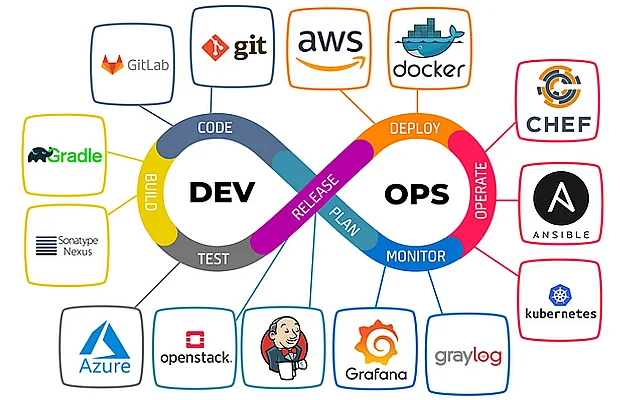Table Of Contents
- Summary
- Introduction
- What is DevOps?
- Why Follow the DevOps Roadmap 2025?
- DevOps Roadmap 2025: Step-by-Step
- DevOps Certifications 2025
- Highest Paying DevOps Roles (2025)
- DevOps Career Paths
- Resources for Learning
- Final Thoughts
Summary
“DevOps Roadmap 2025: From Beginner to Cloud Engineer” is a comprehensive guide that outlines the essential skills, tools, and certifications needed to build a successful DevOps career in 2025. Starting with foundational knowledge in Linux, networking, and scripting, the roadmap progresses through version control, CI/CD pipelines, containerization with Docker, Infrastructure as Code (IaC) using Terraform, Kubernetes orchestration, and cloud platforms like AWS, Azure, and GCP.
This guide also includes a detailed comparison of the most in-demand DevOps tools, salary benchmarks for top roles like Cloud Engineer and SRE, and insights into the best certifications to boost your career. Whether you're just starting out or aiming to become a senior-level engineer, this roadmap will help you navigate the evolving DevOps landscape and position yourself for high-paying, remote-friendly roles in top tech companies.
Introduction
DevOps has become the backbone of modern software engineering. As businesses push for faster delivery and higher reliability, the demand for skilled DevOps professionals continues to rise. According to industry reports, DevOps Engineer was among the top 10 most in-demand tech roles in 2024—and this trend is accelerating in 2025.
In this guide, we'll walk through the DevOps Roadmap 2025, starting from beginner-friendly concepts to the advanced skills required for becoming a Cloud Engineer. You'll find comparisons between popular tools, salary insights, role breakdowns, and best practices to position yourself as a top candidate in the job market.
What is DevOps?
DevOps is a cultural and technical movement that bridges the gap between software development (Dev) and IT operations (Ops). It emphasizes automation, collaboration, continuous delivery, and fast feedback.
Key principles:
- CI/CD: Continuous Integration and Continuous Deployment
- Infrastructure as Code (IaC)
- Monitoring and Logging
- Microservices and Containers
- Automation
Why Follow the DevOps Roadmap 2025?
- High demand: Over 35% of companies are actively hiring DevOps talent.
- Lucrative salaries: Cloud Engineers in the U.S. earn an average of $130,000/year.
- Remote opportunities: DevOps roles are remote-friendly and global.
- Fast-paced innovation: Stay at the cutting edge of software delivery.
DevOps Roadmap 2025: Step-by-Step
1. Learn the Basics of Computer Science
- Linux: Command line basics, bash scripting
- Networking: DNS, HTTP/HTTPS, ports, IP addressing
- Operating Systems: Linux internals, system administration
🔧 Tools: Ubuntu, CentOS, macOS Terminal
2. Programming Languages
- Beginner: Python or Bash scripting
- Intermediate: Go or Node.js for infrastructure tools
📌 Python is the most widely used for scripting and automation.
3. Version Control
- Git: Master Git workflows (feature branching, PRs)
- GitHub / GitLab / Bitbucket: Know how to collaborate
🚀 Use GitHub Actions for basic CI/CD setups.
4. Understand Continuous Integration (CI)
- Tools: Jenkins, GitHub Actions, GitLab CI, CircleCI
- Concepts: Test automation, pipelines, build artifacts
| Tool | Ease of Use | Popularity | Cloud-Native Support |
|---|---|---|---|
| Jenkins | Medium | High | Partial |
| GitHub Actions | Easy | Very High | High |
| GitLab CI | Easy | High | High |
5. Learn Containerization
- Docker: Build, run, and manage containers
- Podman: A secure, daemonless alternative
6. Configuration Management
- Tools: Ansible, Puppet, Chef
- Skills: Writing playbooks, managing environments
| Tool | Learning Curve | Community Support |
|---|---|---|
| Ansible | Low | High |
| Puppet | Medium | Medium |
| Chef | High | Low |
7. Infrastructure as Code (IaC)
- Terraform: Industry standard for cloud IaC
- Pulumi: Uses real programming languages
- CloudFormation: AWS-native option
🌎 Terraform remains the most used tool across AWS, GCP, Azure.
8. Orchestration and Kubernetes
- Kubernetes (K8s): Manage containerized workloads
- Helm: Kubernetes package manager
- Minikube: Local K8s cluster for practice
💡 Kubernetes is now a baseline requirement for most DevOps roles.
9. Monitoring & Observability
- Tools: Prometheus, Grafana, ELK Stack, Datadog, New Relic
- Concepts: Metrics, Logs, Traces (Three Pillars of Observability)
| Tool | Use Case | Cost |
|---|---|---|
| Prometheus | Metrics | Free |
| Grafana | Dashboards | Free |
| Datadog | Full-stack APM | Paid |
10. Cloud Providers
- AWS: 70% of DevOps roles require AWS knowledge
- Azure: Popular in enterprise settings
- Google Cloud: Developer-friendly and growing fast
📊 AWS certifications are the most recognized in the market.
DevOps Certifications 2025
| Certification | Provider | Avg Salary Impact |
|---|---|---|
| AWS Certified DevOps Engineer | AWS | +$15,000 |
| Certified Kubernetes Administrator | CNCF | +$10,000 |
| Terraform Associate | HashiCorp | +$7,000 |
| Microsoft Certified: DevOps Expert | Microsoft | +$12,000 |
Highest Paying DevOps Roles (2025)
| Role | Avg Salary (USA) |
|---|---|
| Cloud Engineer | $130,000 |
| Site Reliability Engineer (SRE) | $145,000 |
| DevOps Architect | $160,000 |
| Platform Engineer | $135,000 |
DevOps Career Paths
- DevOps Engineer: Generalist; works across automation, CI/CD, infrastructure
- Cloud Engineer: Specialized in AWS/GCP/Azure, IaC, Kubernetes
- SRE: Focus on availability, monitoring, reliability
- Platform Engineer: Builds internal platforms, developer experience
Resources for Learning
- FreeCodeCamp DevOps Path
- Kelsey Hightower’s Kubernetes the Hard Way
- AWS Skill Builder
- YouTube Channels: TechWorld with Nana, DevOps Toolkit
- Podcasts: DevOps Cafe, SRE Weekly
Final Thoughts
The DevOps Roadmap 2025 is your ultimate guide to becoming not just a DevOps Engineer, but a highly competitive Cloud Engineer or SRE. With the right skills, hands-on projects, and certifications, you can unlock six-figure salaries and work remotely for top-tier companies.
DevOps is not a one-time skill—it's a continuous journey of learning, adapting, and improving systems.
Start simple, automate often, and scale infinitely.


Add Comment
No comments yet. Be the first to comment!